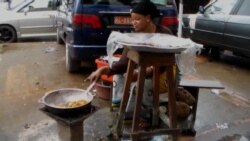World Health Organization (WHO) officials on Thursday warned the magnitude of the Ebola outbreak had been "vastly" underestimated.
The U.N. agency said 1,069 people have died of Ebola this year in Guinea, Liberia, Nigeria and Sierra Leone. The total number of cases is estimated at just under 2,000, but some public health experts, including Dr. Joanne Liu, president of Doctors Without Borders (MSF), say many cases are going unreported as patients resist hospitalization and isolation wards, preferring to entrust their care to family members instead.
WHO officials also said in a Thursday statement that they share concerns that current numbers do not reflect the true gravity of the situation. Liberia and Sierra Leone, the two hardest hit countries so far, have reported at least 182 new cases in the past week, and public health authorities in affected countries say additional resources are desperately needed as they scramble to stop the spread of the disease and isolate those already infected.
In Liberia's capital, Monrovia, MSF is building its largest Ebola treatment center yet, which will have 120 beds. MSF also runs a treatment unit in the northern border town of Foya, in Lofa County.
The group’s emergency coordinator, Lindis Hurum, said it is still not enough.
“Unfortunately, neither of these two units will be sufficient to cover for the need to isolate and care for the patients," she said. "At this stage the outbreak is totally out of control and we need to come up with other strategies to cope with the situation."
Lofa and Montserrado counties are among the hardest hit in Liberia, where health ministry officials are rolling out a new strategy to manage the high volume of suspected cases in those districts. Assistant Health Minister Tolbert Nyensuah says health workers will go to the patients, instead of the other way around,
"If there are too many patients in the community, we can move them to a community structure like a school building [to] provide mattresses, provide feeding, provide hygiene kits to them and health promotion kits that we can manage the people until they can transition to a treatment unit,” he said.
In August, both Liberia and Sierra Leone enacted emergency rule and quarantined the most affected districts. Security forces have set up roadblocks and shut borders.
In the Kenema district of Sierra Leone, security forces have stopped movement in or out, measures that residents call drastic. Locals say the restricted mobility and flow of goods is pushing up food prices, but that they are also necessary and overdue.
“When the first time we heard about Ebola, if the measures that are in place now was in place, I want to believe we should have not reached the peak we are presently in,” said one Kenema resident who withheld her identity.
Complexities of containment
Public health officials say an Ebola outbreak can be contained, but that it must to be snuffed out like a forest fire. No embers can be left to burn, and authorities must isolate both confirmed and suspected cases, after which they must then monitor everyone who may have been exposed to a patient’s bodily fluids for 21 days, Ebola's incubation period.
If any one of those people shows symptoms, they too must go into isolation.
But implementing this procedure is easier said than done. Nigeria, for example, has been monitoring nearly 200 contacts related to just one confirmed case, the country’s first, an air traveler from Liberia who died in Lagos in late July.
In Liberia and Sierra Leone, even as quarantine measures have slowed the large-scale movement of people outside their communities, authorities say the sheer number of cases and contacts to trace is overwhelming.
Sierra Leone’s health minister, Miatta Kargbo, says they need more logistical support.
“We need ambulances. We need vehicles for contact tracing and surveillance," she said. "You may have the funds but the ambulances are not available. This is a challenge that we do have. The logistical support, what is needed to support the fight against Ebola, needs to come faster than we’re seeing from the international community.”
Public health experts say it will likely be months before the outbreak is over. Never have there been so many cases of Ebola in so many places at once.
Dr. Liu, international head of Doctors Without Borders, said Friday that Liberia remains a particular problem. She said stabilizing the outbreak there is key for the whole region.
Adam Bailes contributed to this report from Freetown, Prince Collins contributed from Monrovia and Patrick Jackema from Kenema, Sierra Leone.





